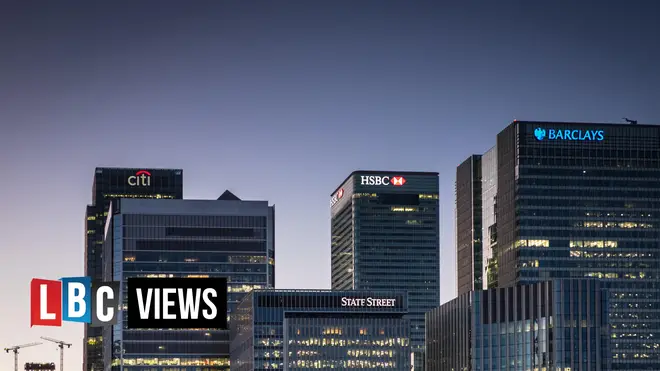
Clive Bull 1am - 4am
25 October 2023, 17:50 | Updated: 26 October 2023, 08:23

There is no denying that the timing for the removal of the bankers' bonus cap, nine years after it was instigated by the EU and five years after the global banking crisis, left a great deal to be desired.
I am fearful at the prospect of a tsunami of vitriolic comment, verbal and written, headed in my direction, with probably LBC's James O’Brien and Carol Vorderman leading the charge, with my own 'Guv'nor' Nick Ferrari in close attendance.
I know they will be full of wrath and indignation at my attempt to extol the virtue of this piece of legislation, which they and many others including the TUC find repellent at a time when most people in the UK are really struggling with the "cost of living" crisis.
Nonetheless, I am prepared for the onslaught and am also determined to logically justify my stance, acknowledging there could never be a perfect time to introduce such a controversial initiative.
The financial services sector contributes approximately £75 billion to the exchequer every year. Pound for pound it is about the most productive part of the UK's economy and constitutes about 8.4% of GDP.
Read more: UK to abolish cap on bankers' bonuses next week
It is also important not to forget that banking is the heartbeat of commercial life. Without sound, strong banks, the economy - from the shirt on my back to everyone's family holiday - would almost certainly dissipate into a puff of smoke.
Banks are needed for the services they provide to keep business, industry and commerce ticking over. Consequently, their services indirectly create jobs.
I know it is stating the obvious; however, job creation generates wealth and therefore taxation for our much-needed public services.
The critics and vilifiers of the banking bonus system must understand and accept that banking is an international occupation and therefore very competitive.
That is the reason remunerations get to such exalted levels. Commentators and media presenters have been on the wires and on television yesterday, castigating the fact that a certain bank CEO in the UK earned £5.3m.
That is probably fair comment. Why? The base salary is far too high.
The CEO's salary and those of his colleagues who trade commodities, currencies and bonds, organise loans, execute M&A activity or fund manage should be paid on results on a similar basis to JP Morgan's Jamie Dimon, who gets a base salary of $1.5 million and bonuses last year - wait for it - of $33 million! That is the correct style of remuneration.
At this juncture it is necessary to return to history to illustrate the path of why we have arrived at this tetchy moment, when much of the public are spitting blood at the prospect of many bankers walking into the sunset with humped backs carrying great wads of largesse to the bank. You may think I am making light of a serious issue – far from it – and here's why.
Cast your minds back to 2008, when the threat of a sub-prime lending and banking crisis were flagged up.
Gordon Brown, the then-Chancellor, was comfortable with soft regulation, supported by the Tories and despite warnings from Governor Lord Mervyn King and his deputy Sir Paul Tucker that bank balance sheets were arriving at unsustainable levels, with inadequate regulation and credit controls.
Royal Bank of Scotland's balance sheet reached £2.4 trillion, almost larger than the UK's! That was insanity personified. Let's not dwell any longer, as the rest is history. Suffice to say, the country is still suffering and has not fully recovered.
The banking sector is very different today than it was in 2008. Banks now require about ten times the amount of capital to do the same amount of business they did in 2009.
The FCA is a much stronger regulator. Bank "stress tests" are formidable and the Bank of England's Prudential Banking Authority under Andrew Bailey and more recently Sam Woods have done a very creditable job in making this sector fit for purpose.
Consequently, those who could earn limitless bonuses are under very strict guidance.
Any misdemeanour by an individual could result in a bonus being lost. Barclays' former CEO Jes Staley is in the embarrassing position of possibly having to pay back £17 million bonuses for previous years for allegedly lacking transparency over his relationship with Jeffrey Epstein.
Other rules that must be adhered to are that half of bonuses must be paid in shares and at least 40% of cash bonuses must be deferred over a minimum of four years. So, shareholders and the public have some protection.
Personally, I do not subscribe to the idea that capping bonuses, if they are conservatively distributed, are likely to be inflationary.
London is the centre of the time zone. London is arguably the second largest financial centre in the world. We have the best legal and accountancy advice in the world, and we are better at financial services than our peers in Europe.
Take foreign exchange; London is in a league of its own. It trades $7 trillion a day. That is up from $4.5 trillion pre-Brexit.
London is also recovering its poise in fund management. IPO business remains disappointing in comparison to New York but remains very strong in fintech finance.
Without being disrespectful, Paris, Amsterdam, Frankfurt, and Rome are Micky Mouse centres in comparison to London.
London needs to be competitive with the rest of the world; hence the need for incentives. The concern over reckless behaviour is much less likely with far greater regulatory controls.
It has taken the government far too long to rescind this EU law post-Brexit. It is not before time and the Government needs "to get the lead out" in implementing less arduous regulatory controls to enable London to remain at the pinnacle of financial society – hence the need for pragmatism against the fury of public opinion.